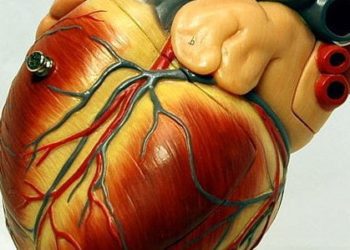Closure devices may reduce complications in percutaneous coronary intervention
Image: PD
1. For patients undergoing percutaneous coronary intervention (PCI), vascular closure devices (VCDs) were associated with an overall reduction of vascular complications such as hematomas, pseudoaneurysms and need for transfusions. This benefit was counterbalanced by an increased risk of retroperitoneal bleeding.
2. The reductions in vascular complications associated with VCDs were lost in the subgroup of patients who received GP IIb/IIIa inhibitors or had BMI<25kg/m2.
Evidence Rating Level: 2 (Good)
Study Rundown: The role of vascular closure devices (VCDs) in reducing vascular complications for patients undergoing transfermoral PCI is unclear. This observational prospective cohort study investigated the association between the use of VCDs and vascular complications in patients undergoing emergent and non-emergent PCI between 2007-2009 in 32 Michigan hospitals. The study found that VCDs were associated with an overall reduction in vascular complications. Analysis of the breakdown of vascular complications showed that VCDs were associated with significant reductions in hematomas and transfusions requirements. However, VCDs were associated with a significant increase in retroperitoneal bleeding. Furthermore, subgroup analysis showed that the benefit of VCDs were lost among patients with a BMI > 25kg/m2 as well as those on GP IIb/IIIa inhibitors. VCDs did not have an effect on mortality. While this study greatly benefited from rigorous matching of the study population to controls, the observational design limits its ability to draw conclusions about causation.
Click to read the study, published today in the Annals of Internal Medicine
Relevant Reading: Arterial puncture closing devices compared with standard manual compression after cardiac catheterization: systematic review and meta-analysis
In-Depth [retrospective cohort]: This study reviewed 85,048 PCIs that were performed from 2007-2009 at 32 hospitals in Michigan via the Blue Cross Blue Shield of Michigan Cardiovascular Consortium. Demographic, procedural, and angiographic information was prospectively defined and data was recorded. The patients were identified into two groups: (1) VCD or (2) No VCD.
Patients in both groups were were matched based on baseline variables. Cases were then reviewed for one of three endpoints: vascular complication, transfusion, or in-hospital death. It was found that 28,528 (37%) of patients had a VCD used and that VCD usage resulted in a significant reduction of vascular complications OR 0.78 [95% CI 0.67-0.90, p = 0.001] and specifically a decrease in hematomas OR 0.69 [95% CI 0.58-0.76, p<0.001] and pseduoanerysms OR, 0.54 [95% CI 0.38-0.76, p<0.011]. There was also decreased postprocedure transfusion OR 0.85 [95% CI 0.74-0.96, p=0.011]. Interestingly, the authors also found an associated increased risk of retroperitoneal bleeding OR, 1.57 [95% CI 1.12-2.30, p=0.009].
By Adam Whittington and Aimee Li, MD
More from this author: Home-based intervention reduces depressive symptoms in older African Americans, Self-measured blood pressure monitoring lowers pressures compared to typical clinical monitoring, Insufficient data for screening asymptomatic adults with ankle-brachial index, Arsenic exposure linked with cardiovascular disease and mortality, Increased risk of invasive meningococcal disease for patients with HIV
© 2013 2minutemedicine.com. All rights reserved. No works may be reproduced without expressed written consent from 2minutemedicine.com. Disclaimer: We present factual information directly from peer reviewed medical journals. No post should be construed as medical advice and is not intended as such by the authors, editors, staff or by 2minutemedicine.com. PLEASE SEE A HEALTHCARE PROVIDER IN YOUR AREA IF YOU SEEK MEDICAL ADVICE OF ANY SORT.






